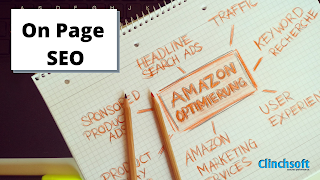Keywords,
content, and on-site SEO
In the past, onsite SEO
was synonymous with keyword usage, specifically including high-value keywords
in several key locations on your website.
To understand why
keywords are no longer central to SEO , it is important to
remember what these words are: content topics. Historically, pages ranked by a
particular term used the right keywords in certain expected locations on a
website so that search engines could find and understand what the content of
that web page was. Did it depend on what you did? The user experience was
secondary. Ensuring that search engines find keywords and rank your site as
related to those terms was central to onsite SEO practices.
Today, however, search
engines have become increasingly more sophisticated. Is it organized on your
site in such a way that it is easily navigable? While the use of keywords still
matters, the expected number of scheduled times, like using exact-matched
keywords in specific methods, is no longer a tenant of on-page SEO. What is
important is relevance. For each of your pages, ask yourself how relevant is
the user's intent behind the search query (based
on your keyword usage on the page and in its HTML).
In this way, onsite
SEO is about understanding
who the user is, what the user wants, and what topics (keywords) they are
looking for, not about repeating or placing keywords. With, you can create
content that best meets your needs. Pages that meet these conditions have the
following content:
• In depth. "Thin" content was one of the specific
goals of Google Panda; Today it is more or less believed that the content needs to be sufficiently
thorough to create a good chance of ranking.
• User-friendly. Is the content readable? Is it organized on
your site in such a way that it is easily navigable? Is it usually clean, or
lazy with advertisements or affiliate links?
• Unique.If not properly addressed, duplicated content from
elsewhere on your site (or anywhere else on the Internet) can affect a site's
ability to rank on SERPs.
• Authoritative and trustworthy.Does your content stand on
its own as a reliable resource for information on a particular subject?
• Aligned with user search intent.Part of creating and
optimizing quality content also depends on the expectations of the searcher.
Content topics should align with the search queries for which they
rank.Non-keyword-related on-site SEO
In addition to the
keywords (topics) used in the content on a webpage and how to discuss them,
there are several "keyword-agnostic" elements that can affect the
site's optimization of the page.
Those include things
like:
• Use links on a page: how many links are there? Are they
internal or external? Where do they point?
• Schema.org uses structured data or other markup
• Page URL structure
• Mobile friendliness
• Page metadata
All of these factors are
based on the same basic idea: to create a better user experience. The more
usable a page is (from a technical and non-technical point of view), the better
the on-site optimization of the page.
Fully customizing the
page on your website requires both text- and HTML-based changes. See this
article for more information on the components of a site that contributes to
ranking and how you can improve your own website pages.
Read more.....


No comments